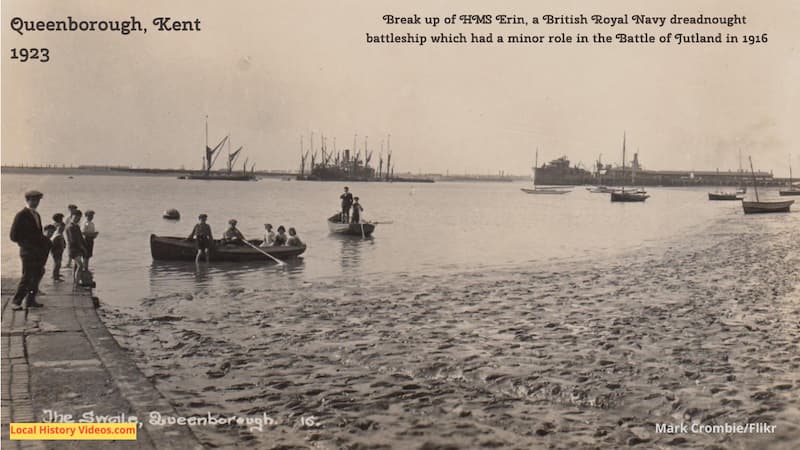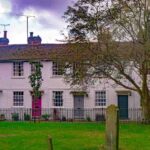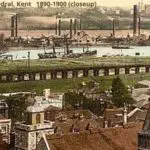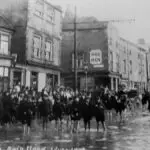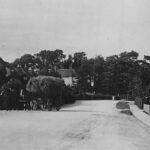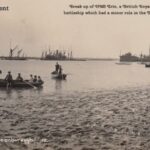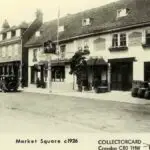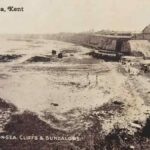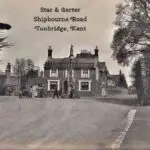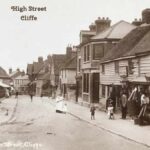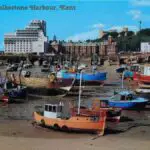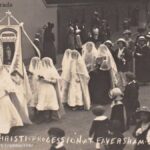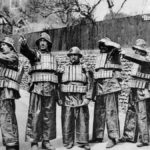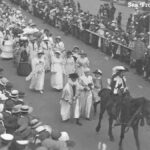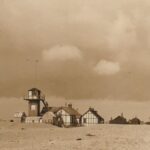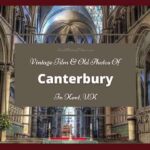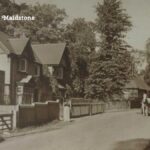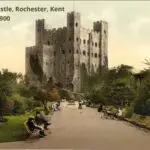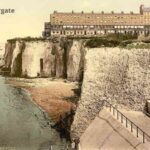Glimpse history and old images of Queenborough, Kent, England
Historic Book
Extract from “Chambers’s Journal of Popular Literature, Science and Arts“
Published in 1855
Pages 193-196
SOME ACCOUNT OF A BOROUGH
As there can be no place , however insignificant , where
men have congregated , and acted their various parts in
the drama of life , without its history ; so there can be
no history , however trivial , without its moral . We
need not , then , apologise for occupying the reader’s
attention with so poor a place as Our Borough . More
over , obscure though it be , it has been consecrated by
the footsteps , and immortalised by the pencil of genius .
The great pictorial moralist , satirist , and , we may say ,
historian of his era – he who held the mirror up to
nature , shewing vice her own features , scorn her
image , and the very age and body of the time its form
and pressure – did not disdain to draw its main and
only street ; and as it was then , so it is now at the
present day .
One hundred and twenty – three years
ago , on a fine May morning , Will Hogarth , Thornhill
his brother – in – law , Scott the landscape – painter , and
two other friends and boon – companions , started from
the Bedford Arms Tavern , in Covent Garden , ‘ to the
tune of Why should we quarrel for Riches ? ‘ The first
land they made was Billingsgate , where they ‘ dropped
anchor at the Darkhouse ; ‘ from whence , after Hogarth
had made a caricatura of the Duke of Puddledock , they
embarked for Gravesend . How , in the boat , with
straw for a bed and a tilt for a covering , they ate hung
beef , drank Hollands , smoked tobacco , and sung St
John – how they landed at Gravesend , got their wigs
powdered , and went to Rochester , where Hogarth and
Scott chalked out a hop – scotch , and played that juvenile
game under the very colonnade of the town – hall , to
the utter dismay and disgust of the parish – beadle
how they visited Sheerness , where Hogarth was
laughed at for sitting down to cut his toe – nails in
the garrison ‘ – we have nothing whatever to do with .
Besides , is it not all related and portrayed in the
facetious journal they brought back to amuse the
members of their club ? -which was subsequently
published , and to which we refer those of our readers
who are not too refined to enjoy a laugh at the coarse
frolics of our ancestors . But when they left Sheerness ,
as they journeyed to Queenborough , the subject – borough
of this paper , we are bound to follow them there , and
describe it in the words of Forrest , the historiographer
of the merry expedition .
The town is but one street ,
and answers the description I have heard of a Spanish
town – namely , there is no sign of any trade , nor
were many human creatures to be seen at our first
arrival .
They found , to their sorrow , ‘ that though
Queenborough was a market – town , yet they could not
procure ‘ one piece of fresh meat of any sort , nor
poultry , or fish . They , however , ‘ got a wooden chair ,
and placed Hogarth in it , in the street , where he made
a drawing , and gathered a great many men , women ,
and children , to see his performance . ‘
They visited
the church , and found nothing there worthy of notice .
But they had a conference with the grave – digger , who
informed them that the mayor was a custom – house
officer , and the parson a sad dog .
Hogarth’s party
would have had another laugh if they had known that
the mayor , when not engaged in official duties , followed
his humble occupation of a thatcher ; and if they had
known that the incumbent’s stipend was only L.52 per
annum , with a right of grazing worth about L.7 more ,
they might have said that the Queenborough people
could not expect a very merry dog for so little money .
John Taylor , the water – poet – who made a Penniless
Pilgrimage into Scotland in 1639 , and rode a – hunting
in the Highlands when Englishmen knew as little of
them as of Timbuctoo – also visited Queenborough , in
a very extraordinary manner . Having constructed a
boat of brown paper and bladders , Taylor , in company
with a congenial soul , a jolly vintner named Roger
Bird , sailed from London on a Saturday , and , after
many adventures and dangers , found themselves , to
their great joy , at daylight on the following Monday
morning , close to Queenborough , where they gladly
landed , and Taylor thus describes their reception in his
Praise of Hempseed :
The mayor of Queenborough , in love , affords
To entertain us , as we had been lords .
It is a yearly feast , kept by the mayor ,
And thousand people thither do repair ,
From towns and villages that’s near about ,
And ‘ twas our luck to come in all this rout .
l ‘ the street , bread , beer , and oysters is their meat ,
Which freely , friendly , shot – free , all do eat .
But Hodge and I were men of rank and note ,
We to the mayor gave our adventurous boat ,
The which ( to glorify that town of Kent )
He meant to hang up for a monument .
He to his house invited us to dine ,
Where he had cheer on cheer , and wine on wine ,
And drink and fill , and drink , and drink , and fill
With welcome upon welcome , welcome still .
Taylor does not tell us the trade or calling of this
hospitable mayor ; but as we have seen that , in Hogarth’s
time , the mayor was a thatcher , and as there is a
monument in the church – yard to a mayor – mariner , we
may conclude that he did not hold a very high social
position .
Even in this present century , a mayor who
died in 1829 , was not above performing the offices of
both judge and executioner , as his predecessors in the
mayoralty had done before him .
The general punish
ment for petty offences in Queenborough was a flogging ;
and the mayors , after passing sentence er officio , would
descend from the judgment – seat , and with their own
hands apply the lash .
Men – of – war’s – men from the
dockyard of Sheerness used to be very fond of larking
excursions in the neighbouring villages , but they
carefully avoided Queenborough . The summary juris
diction , the nervous arm , and formidable cart – whip of
the mayor , were worse than the court – martial , the cat
o ‘ – nine – tails , and the boatswain’s mate .
Long , indeed , before either Hogarth or Taylor visited
Queenborough , its mayor had been described in rather
contemptuous language . In the Academy of Compli
ments , published in 1614 , we find the following uncom
plimentary mention of that functionary , among a long
collection of doggrel truisms :
Pease – pottage is a Lenten dish ;
Pudding is neither flesh nor fish ;
Some cheese will choke a daw ;
The mayor of Queenborough is a clown ;
The lawyer wears a daggled gown ;
Wat Tyler and Jack Straw .
Queenborough is situated in a nook of the fertile
county of Kent , about three miles from Sheerness ,
where the island of Sheppey is divided from the main
land by the creek or channel termed the Swale . Its
original name was Middleton ; but , somehow or other
-for , as Napoleon said of Gibraltar , ‘ it opens nothing ,
shuts nothing , leads to nothing ‘ – Queen Philippa ,
consort of Edward III . , happening to land there , that
monarch , in honour of the event , gave it the name of
Queenborough .
Considering it an advantageous place
for commerce , Edward gave the town a charter , consti
tuting it a free and perpetual borough . The twenty
six houses then in the place were endowed with rich
pasture – lands , and the valuable oyster – fishery of the
Swale was given to the burgesses for ever .
The powers
granted to the mayor by this charter could be explained
only by a legal antiquary : suffice it to say , they were
about equal to those enjoyed by MacCallum More in
his castle of Inverary .
The English Justinian – as the third Edward has
been termed – thought , by granting these privileges , to
make Queenborough a great commercial port ; but he
was mistaken . As soon as they acquired these boons ,
the mayor and burgesses sat down to enjoy them , and
then commenced a petty squabbling as to who should
individually reap the greatest benefit from them . At
the same time , they carefully excluded foreigners – as
they denominated persons born out of the liberties
from any share .
Though from Edward , or at a sub
sequent period , Queenborough obtained the privilege
of sending two members to parliament , the town did
not improve . The petty squabbling continued till a
few years ago , when the last oyster was dredged up
out of the Swale , and the borough was L.17,000 in
debt , with a poor – rate of 9s . in the pound .
Some of the old court – books of the borough are
before us , and cause us to wonder as to the food eaten
by the inhabitants in the olden time . Did they lite
rally , as well as metaphorically speaking , live upon
oysters alone ? -for we find no crime so frequently
punished as that of being a common butcher , or ‘ a
common baker of human bread . ‘
Scolds , too , and
foreigners , met with no mercy . One John Clarke was
apprehended for being a Scotchman , as is supposed ; “
and on this mere suspicion , it is commanded that he
be kept in safe custody . ‘
But the mass of these records
are an endless course of litigation concerning the rights
of pasturage ; particularly something entitled ‘ surplus
pasturage , which , as none of the privileged seem to
know what it really meant , we may surely be excused
from attempting to explain .
Yet these were the pros
perous days of Queenborough : we must now come to
its decline and fall .
Under the date of 1799 , about forty years before the
borough , after long litigation in the higher courts , fell
into a hopeless state of insolvency , there appears in
the parish – books , by order of the corporation , the fol
lowing characteristic and ominous entry , which , as the
herald , and partially the cause , in all probability , of
the coming misfortunes , fully deserves a line to itself :
‘ No scooling to be paid . “
Forty shillings , only , was the yearly pittance doled to
the schoolmaster ; yet poor Queenborough , with its rich
pasturage and fishery , decreed ‘ no scooling to be paid . “
We should mention here , also , that the borough derived
considerable emolument from its privilege of returning
two members to parliament .
Hasted , the historian of
Kent , writing in the last century , says : ‘ Queenborough
consists of one principal wide street , containing about
150 houses . The principal source of wealth to it is
the election for members of parliament , which secures
to some of the chief inhabitants many lucrative places
in the Ordnance and other branches of government . “
In fact , it may be said that for many years the Board
of Ordnance nominated the members for the borough .
Whatever the original constitution of the borough
may have been , the entire control of the property and
expenditure of the corporation ultimately fell into the
hands of seven persons – the mayor , four jurats , and
two bailiffs , who elected each other as they thought
proper .
The mayor was elected by these persons
writing the name of their choice on a piece of paper ,
which was folded up and given into the hands of the
town – clerk , whose office had become almost hereditary .
The town – clerk then went home , and opening the
papers , announced the result of the election by sending
the serjeant – at – mace with a goose to the house of the
person who had the majority of votes ! We are quoting
from parliamentary blue – books , and , consequently ,
trust our readers will not think we are presuming to
jest with them .
The mayors were generally re – elected
for considerable periods . One held office as long as
twenty years ; and as he was ex officio returning – officer
for the borough , this practice was decidedly illegal .
The burgesses had no voice in the management of the
corporation affairs ; and , being almost all employed in
the oyster – fishery , termed themselves free – dredgers
though , in fact , they were little better than the serfs
of the select seven , who formed the governing body .
The
The principal advantage of the oyster – fishery con
sisted in the possession of the Swale as a rearing and
feeding ground for these popular shell – fish .
Every
spring , a quantity of the spat , or young brood , was
purchased by the corporation , and deposited in the
Swale , where , in the course of a few years , they grew
to be marketable oysters of a peculiarly excellent
flavour .
A successional course of beds , of different
aged oysters , were thus kept up , and a regular spring
supply of spat was absolutely necessary to carry out
the system .
The free – dredgers were employed in
depositing the spat and dredging up the oysters .
corporation sold the oysters , and allowed the dredgers
a participation in the profits , in the shape of wages ,
varying in amount according to the prices obtainable
at market , the favourable or adverse state of the
weather , and the many other casualties ever attendant
on a somewhat precarious speculation .
The machinery
of an irresponsible municipal corporation is little
adapted to carry on a purely commercial undertaking .
As no fund , even in the most prosperous seasons , was
ever reserved for contingencies , and the yearly feast
described by Taylor , and the seven annual dinners
given by the mayor to the corporation magnates , were
attended with considerable expense , it may readily be
supposed that in some springs there was not sufficient
money in hand to stock the beds .
Money , then , ha
to be borrowed , on the security of the ensuing winter
fishing . This was a system very easy to begin , bu
very difficult to leave off ; and so the corporation foun
it .
From occasionally borrowing small sums at firs
they at length were compelled , about 1815 , to borrow
from five to ten thousand pounds every spring , for the
purpose of replenishing the oyster – beds ; and from th
legal expenses in preparing the bonds , and other causes
they seldom paid less than ten per cent . for the use a
the money .
The free – dredgers , having a very high idea of thei
rights and privileges , never condescended to perform
any other kind of labour ; and , as their families increase
in number , while the oysters decreased , the yearl
interest payable for stocking the beds became a very
heavy tax upon their earnings .
In short , they fell
into poverty ; and as poverty begets discontent , they
became rebellious to the select seven . The mayor , too
at this period , an active and energetic man , having
great faith in the efficacy of the cart – whip and loaded
pistols , inflamed rather than allayed the increasing
discontent .
Two parties were formed in the borough
the party of the governing body , and that of the free
dredgers . The only two public – houses in the place
were the head – quarters of each . No dredger would
enter or taste the beer of the corporation – house ; while
mo corporation – man would enter or taste the beer of the
tredgers – house .
Though it was absolutely necessary .
or the success of the fishery , that certain rules and
by – laws should be observed , the dredgers resisted the
regulations of the governing body , committing acts for
the mere purposes of annoyance ; while the select seven
treated the dredgers in a most oppressive manner
When the dredgers locked up the select seven for
whole day in the town – hall – when a dredger challenged
the mayor to a bout at fisticuffs – the governing body ,
instead of preferring indictments at the quarter – ses
sions , moved for criminal informations at the court of
King’s Bench , merely to distress and intimidate their
opponents .
The little money the dredgers had saved
was soon expended in law – expenses ; and then the
governing body , after expending some thousands of
pounds of the corporation – money in law – costs , made
still more stringent by – laws , which debarred the most
obnoxious of the dredgers from any employment at the
fishery .
After a seven years ‘ continuous course of law
proceedings between the dredgers and the governing
body , it may easily be supposed that the lawyers had
prospered much better than the oyster – beds .
Such was the condition of affairs , and a severe winter
had reduced the oppressed and contumacious dredgers
to the most abject poverty , when they suddenly found
a benevolent , yet not altogether disinterested friend .
This gentleman established a soup – kitchen for their
relief , supplied the women with petticoats and blankets ,
and the men with Guernsey – shirts . Beer once more
was drawn and drank at the dredgers ‘ pot – house ;
tobacco , latterly an unattainable luxury , was chewed
and smoked ; and , more mysterious still , smack – loads
of dredgers were spirited away to London , where they
were feasted with rare viands and rich wines , and
introduced to men learned in the law , to whom they
related their rights and their wrongs .
Something
evidently was in the wind ; but the select seven rested
in fancied security , little aware of the storm that
was brewing .
At last , a free – dredger brought an
action at law against the governing body , to try
their right of making the obnoxious by – laws . The
dredger who brought this action , though previ
pusly in poverty , engaged , at three – hundred – guinea
briefs , the serjeants most skilled in municipal law ;
and the Great Fishery Case , as the Kentish people
termed it , came on at Maidstone assizes .
More
than a hundred dredgers appeared as witnesses on
their side ; but , being interested parties , their evidence
could not be received .
The governing body , however ,
disfranchised their officers , so that they could give
evidence , recompensing the disfranchised with a pen
sion of a shilling a day for life , and enfranchising them
again immediately after the trial .
This was most
certainly a twofold act of injustice , as it tended to
corrupt the witnesses , and was an undue application of
the corporation funds . Even the mayor was not above
taking a pension of a shilling a day for life ; and so
often was he disfranchised and enfranchised , in a short
period , for the purpose of giving evidence , that he was
five times elected to the mayoralty in one year !
The
select body did not gain much by the disfranchising
move , the counsel on both sides depending more on
old charters and other documents , than vied voce
evidence .
The trial lasted three days ; then the jury
were locked up ; and on the fourth gave their verdict ,
declaring the title of the corporation to the fishery to
be affirmed , but their by – laws to be unreasonable .
The free – dredgers , accepting this as a verdict in
their favour , returned in triumph to Queenborough .
The next day , with colours flying , and amidst the
firing of guns and an unlimited consumption of beer ,
they manned their boats , proceeded to the fishing
ground , caught some oysters , and eating them on the
spot , thus , as they considered , took possession of and
proved their lawful rights .
Where the money came
from to carry on this expensive trial on the dredgers ‘
side , and to supply so many barrels of beer and pounds
of tobacco , was a mystery soon to be solved . The
money spent by the corporation on the action , of
course came out of the fast – diminishing oyster – beds .
Shortly after the trial , a dissolution of parliament
took place , and who was so fit to represent the free
dredgers as the benevolent gentleman who had so
nobly befriended them ! Accordingly , a deputation
waited on him ; was favourably received ; and , for the
first time during many years , the Ordnance interest in
the borough met with opposition .
The governing body
were astounded ; the number of voters were about 300 ,
while the free – dredgers numbered 155 ; besides , many
of the burgesses , who would have voted in the Ordnance
interest , were snugly installed in its employment , and ,
consequently , being servants of the government , were
ineligible as voters .
The select seven , however , were not inactive . Bur
gesses were made and unmade , and recourse was had
to every electioneering trick that could be put in
practice .
At last the day of election came . The
nominees of the Ordnance Board were proposed and
seconded by the mayor and corporation ; the benevolent
gentleman by two free – dredgers , who also were dissent
ing preachers . The voters came to the poll but slowly .
To the dismay of the benevolent gentleman and his
agent , the free – dredgers were nowhere to be seen : they
had rolled off some of the barrels of beer gratuitously
supplied on such occasions , and having taken posses
sion of an empty store – house , were deliberating , with
closed doors , as to which of the candidates they should
vote for .
Here was gratitude ; but , as one of the
deliberators told us , ‘ every man has a right to do the
best for himself .
The agent of the Ordnance interest
first discovered where the dredgers had retired . He
went , knocked at the door , was admitted , and offered
certain reasons for their voting on his side ; their reply
was : ‘ We are no scholars , sir . The agent of the bene
volent gentleman next discovered where they were ,
and he also advanced sundry reasons ; which , being
considered valid , the dredgers marched up to the poll
in a body , and the Ordnance interest received its first
blow in Queenborough .
We have asked the old free-
dredger above referred to , wherein consisted the supe
riority between the reasons of the Ordnance agent
and those of the agent of his benevolent friend ; but
his only reply was a wink and a grin , and that subsi
dence into stolid taciturnity so often met with among
people of his class . We have been told , however , that
the reasons advanced by the Ordnance agent were
merely pieces of paper , on which certain words and
figures were impressed , but which the free – dredgers ,
not being able to read , could not clearly understand ;
whereas the reasons proffered by the more astute agent
of the benevolent gentleman were round , yellow pieces
of metal , whose validity were easily comprehensible to
the most illiterate .
As soon as the benevolent gentle
man found himself in parliament , he brought in a bill
to regulate the fishery , which the select seven spent a
considerable sum in opposing .
But another dissolu
tion took place ; another election followed , with a simi
lar result ; and then the besom of destruction , in the
shape of the Reform Bill , swept Queenborough into
schedule A , where , it is to be hoped , it will remain
until it becomes the great commercial entrepôt Edward
III . designed it to be .
In 1829 , the mayor , who had ruled during the
troubled period from 1815 , died . This person invariably
wore two watches , that he might never be mistaken in
the correct time ; he also , for the last seven years of
his life , always carried a pair of loaded pistols , which
he openly exhibited , avowing his intention to shoot
any one who dared to molest him .
Every person in
Queenborough not too young , too old , or too feeble ,
attended his funeral . As the clergyman was reading
the impressive burial – service of the English Churchi ,
when he came to the solemn words , ‘ Earth to earth ,
ashes to ashes , dust to dust , ‘ and the clerk , as is
customary , was throwing a handful of earth into the
grave , a shower of half – pence was flung in upon the
coffin by part of the assembled crowd . To the inquiring
look of the astounded clergyman , they cried out that
the coppers were to pay the deceased mayor’s passage
to a place unmentionable to ears polite .
That night
the free – dredgers illuminated their houses , and smashed
the windows of those who did not ; while those who
did not illuminate , retorted by smashing the windows
of those who did .
This riot – a practical commentary
on the text , ‘ No scooling to be paid ‘ – was another
rare catch for the lawyers from the oyster – beds of
Queenborough .
In 1830 , the corporation were L.20,000 in debt ,
L.11,000 of which were law – expenses . They paid off
the whole of this debt , but were unable to stock the
oyster – beds that year .
The following year , however ,
the beds were stocked ; and in the five years from 1833
to 1838 , the fishery yielded a gross revenue of L.58,000 .
But the corporation and free – dredgers had so long
enjoyed the expensive luxury of going to law , that it
would seem as if they could not exist without it . In
short , the lawyers were destined to swallow up the
oysters , shells and all .
In 1838 , the corporation
stocked the beds for the last time ; and two years
afterwards – being L.12,000 in debt , and nobody inclined
to lend them any more – they prepared for the impend
ing insolvency by raising and selling the last remain
ing oysters ; so , when the sheriff of Kent appeared
upon the scene , there was nothing for him to seize and
sell but the paraphernalia of the corporation – their
books , mace , and cart – whip . The latter , so long the
terror of mischievous sailors , and other evildoers , now
lies , like a warrior taking his rest , on the library – shelf
of a Kentish antiquary .
The creditors , then , had no other resource than to
petition the legislature for its interference ; and ,
accordingly , a commissioner was appointed to inquire
into the affairs of the corporation . The commissioner
found that the debt , with interest , amounted to nearly
L.17,000 ; and the result of his report was , that parlia
ment , in 1844 , passed an act , vesting the property and
privileges of the borough in the hands of trustees ,
until its debts should be paid .
This act at once
restored peace to the conflicting parties in Queen
borough , for they unanimously united to embarrass and
thwart the trustees as much as possible .
The oyster
fishery was gone ; but still there remained the time
honoured bone of contention , ‘ surplus pasturage , to
go to law about . So the debt is still L.17,000 , the
trustees being compelled to expend L.4000 in law – costs ,
contending with the litigious people , whose mismanaged
property they are endeavouring to improve .
But as , by
an act of last year’s parliament , Queenborough Common
has fallen into the possession of the Inclosure Com
missioners , it is probable that the question of ‘ surplus
pasturage ‘ has at last been set to rest for ever .
In
conclusion , we need scarcely observe , that , like Sam
Weller’s friend , the Chancery prisoner in the Fleet ,
who was ruined by having an estate left to him , so
Queenborough was prevented from rising in the world ,
and ultimately brought to utter ruin , through having
been granted privileges .
More about Kent
- Ashford, Kent: History in Old Images
- Old Images of Kent, England
- Old Images of Chatham, Kent
- Old Images of Rolvenden, Kent
- Old Images of Queenborough, Kent
- Old Images of Westerham, Kent
- Old Images of Birchington-on-Sea, Kent
- Old Images of Tonbridge, Kent
- Old Images of Cliffe, Kent
- Old Images of Folkestone, Kent
- Old Images of Faversham, Kent
- Old Images of Broadstairs, Kent
- Old Images of Dover, Kent
- Old Images of Dungeness, Kent
- Canterbury, Kent: History in Old Images
- Old Images of Maidstone, Kent
- Old Images of Rochester, Kent
- Old Images of Margate, Kent

